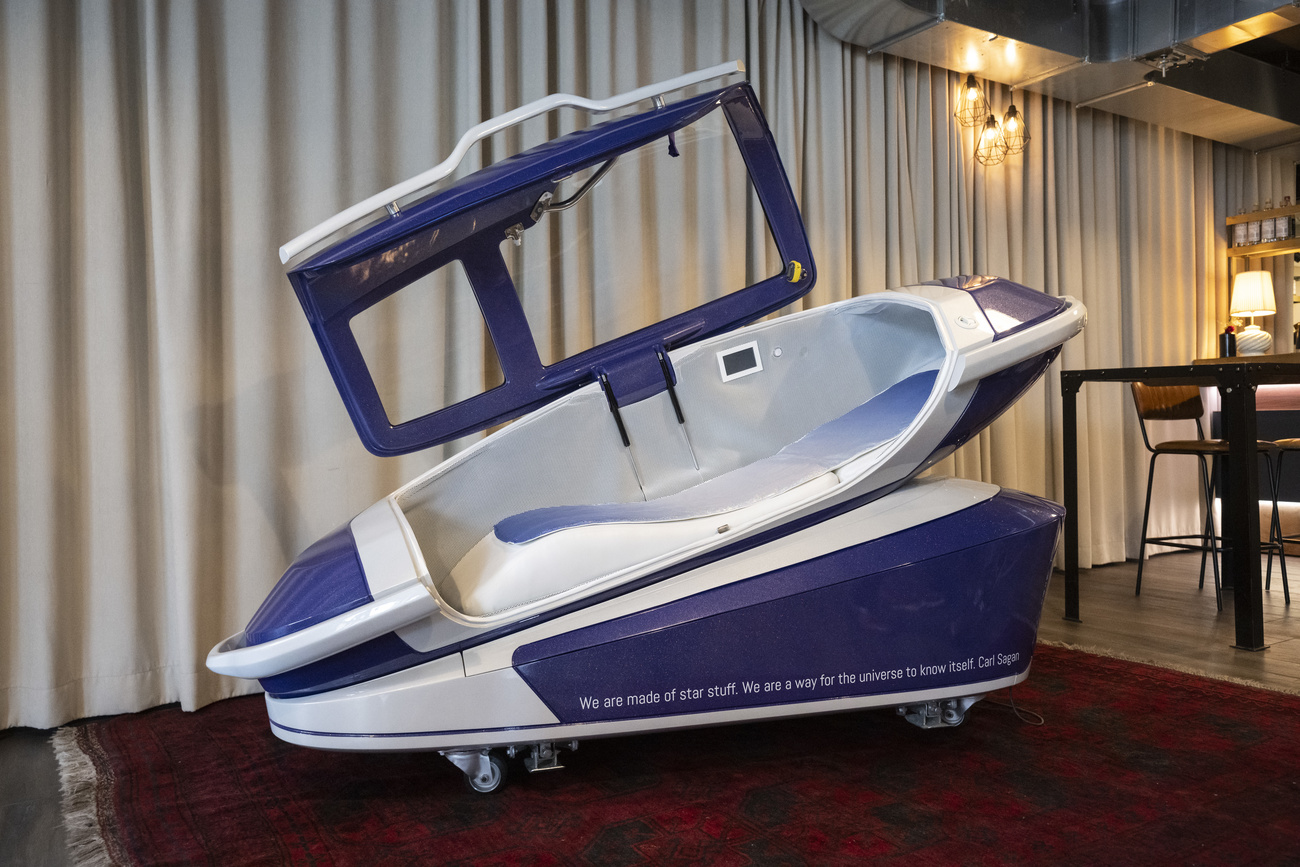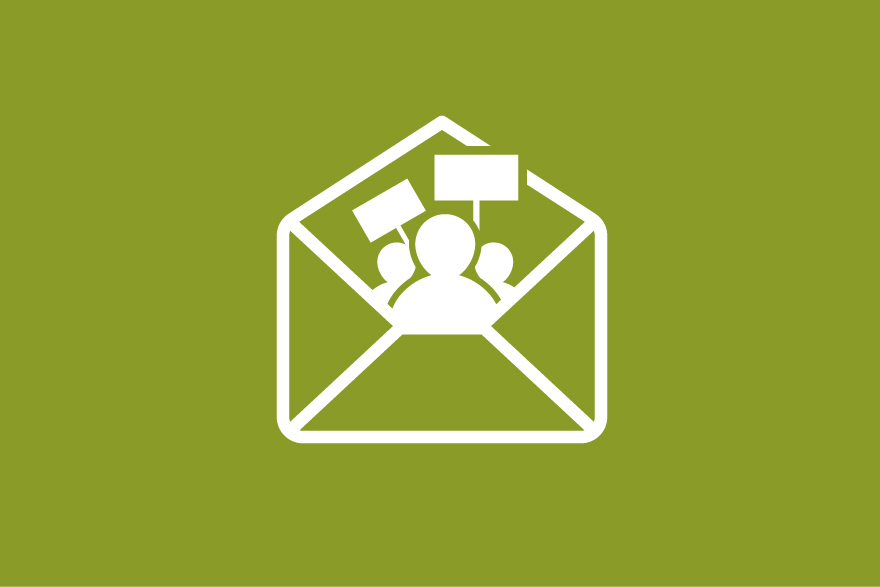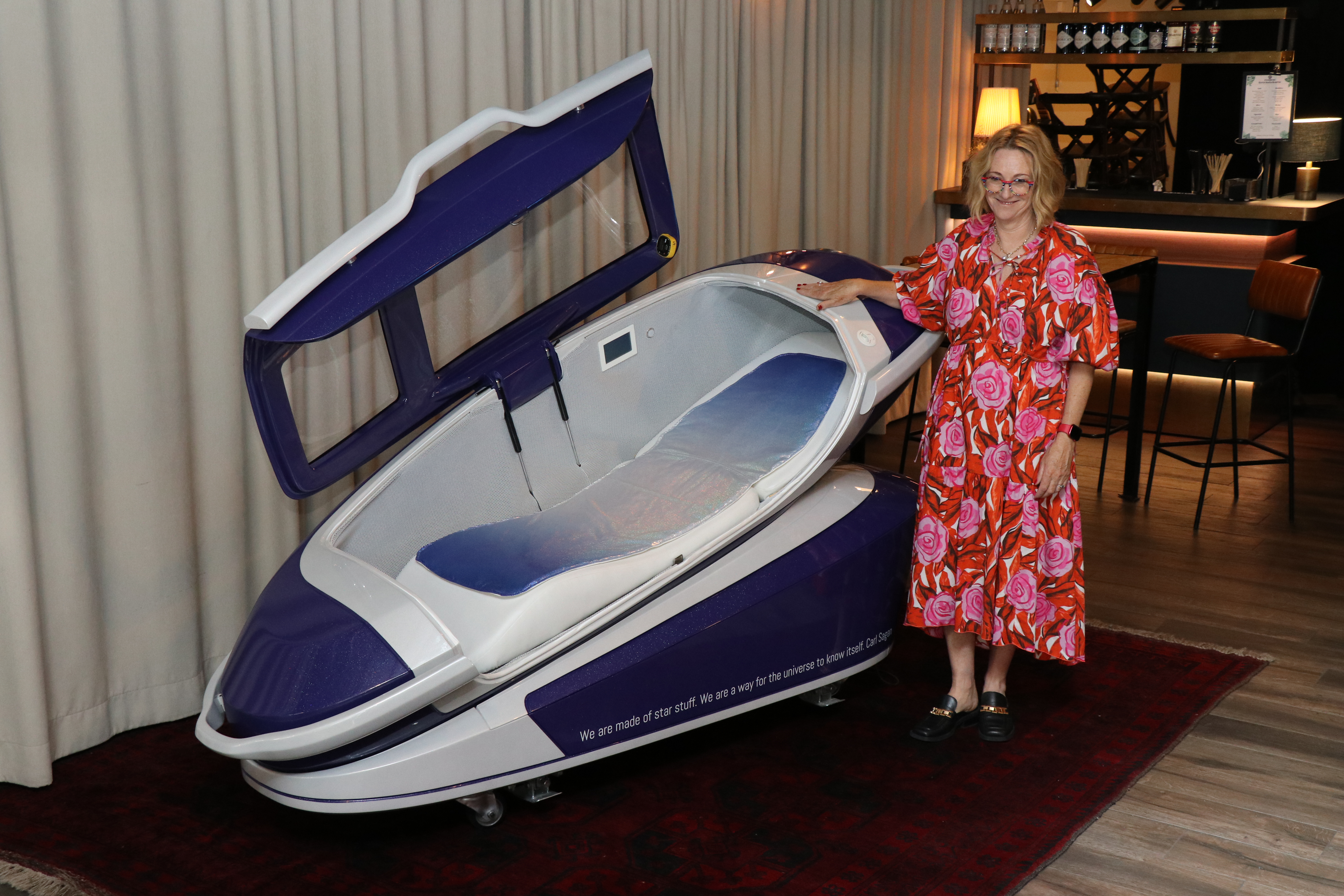After the first ‘Sarco pod’ death, will Switzerland introduce stricter rules for assisted suicide?

The first death to come about using the Sarco capsule has reignited debate on whether assisted dying should be more tightly regulated in Switzerland. Here are some answers to the main questions.
The first suicide in the Sarco capsule took place last September in a forest in the Swiss canton of Schaffhausen, near the German border. The person who wanted to die, a 64-year-old American woman suffering from an immune disease, explained briefly in a video recording why she wanted to end her life. She then sat down in the capsule and when the system was ready, pressed the button. Minutes later she was dead.
This is how the scene was later described by a photographer from the Dutch newspaper De Volkskrant, who witnessed the suicide together with members of the assisted-dying organisation The Last Resort.
Philipp Nitschke, right-to-die activist and inventor of the capsule, followed the happenings from Germany. This enabled him to escape arrest, unlike those present at the location.
Already in mid-year, the canton of Schaffhausen had made it clear that anyone involved in using the capsule would face prosecution. The first person who wanted to die using Sarco, also an American woman, subsequently retracted her decision. She later took her life with the help of an established Swiss assisted-dying organisation. Before her death, she levelled serious accusations against The Last Resort.

In using the Sarco pod for the first time, The Last Resort ignored the warnings of the Swiss authorities. On the very same day, the health minister declared that use of the capsule was not permitted in Switzerland.
The situation as it stands today raises many questions:
Have legal proceedings been brought against The Last Resort?
Most of the people who witnessed the suicide in the Schaffhausen forest were released shortly after their arrest. However, Florian Willet, co-president of The Last Resort and former media spokesman for Dignitas Germany, spent 70 days in custody. He was only released in early December.
On the same day, the Schaffhausen public prosecutor’s office announced External linkthat there was no suspicion of homicide. However, there was a “strong suspicion of inciting and assisting suicide”.

It remains to be seen whether charges will be brought. However, a lawsuit would not necessarily run counter to the aims of The Last Resort, as the legal framework for assisted suicide has so far mainly been set by leading judgements of the Federal Court.
Is using the Sarco capsule illegal in Switzerland?
The Federal Court will likely have to rule on this one day. And most probably the answer will be no. Although various authorities in Switzerland have deemed its use to be unlawful, the reasons given seem somewhat arbitrary and hardly withstand scrutiny.
The canton of Valais, for example, argued that the capsule has not been approved by the Swiss surveillance authority for medicines and medical devices, Swissmedic. The agency, however, stated that it did not have jurisdiction over the capsule as it is not a medical device.
Swiss Health Minister Baume-Schneider, meanwhile, told parliament that the Sarco capsule did not fulfil the requirements of product safety legislation, and that the use of nitrogen in the capsule also contravened the Chemicals Act.
It is questionable, though, whether these laws are applicable in the context of assisted dying, which touches on people’s fundamental right to determine their own death. One reason for doubt is a Federal Court ruling from last March: in the most sensational case in recent years, the highest tribunal acquitted Pierre Beck, the former vice-president of assisted-dying organisation Exit in French-speaking Switzerland.
Beck had assisted the suicide of a healthy 86-year-old woman, who wanted to die together with her seriously ill husband. The Federal Court ruledExternal link that neither the Therapeutic Products Act nor the Narcotics Act were applicable in this case.
Various observers have already expressed the view that the Product Safety Act cited by the Swiss government is not applicable to the Sarco capsule.
This leaves the Swiss Criminal CodeExternal link as the legal basis for the matter. Under Article 115, assisted suicide is forbidden in Switzerland if it is carried out for “selfish motives”; and the act must be carried out by the person themselves (although this point is disputed among lawyers). Medical due diligence responsibilities must be adhered to in assessing the state of health and capacity for discernment of the person wishing to die.
The Swiss Academy of Medical Sciences also issues guidelines for doctors involved in such situations, although these are not legally binding. Assisted-dying organisations moreover set their own conditions and restrictions for their services.
Are Swiss right-to-die organisations now calling for stricter regulations?
In short, no. SWI Swissinfo.ch put this question to the established Swiss assisted-suicide organisations. Only Erika Preisig, from the organisation Lifecircle, spoke out in favour of a restriction, and only on one point: “I believe that every newly founded organisation should have to obtain an operating licence, just like a doctor who wants to open a practice.”
The German-speaking region’s branch of Exit, the country’s largest assisted-dying organisation, argues most clearly against stricter regulation. “Any special law would restrict assisted suicide compared to today. It would regulate details unnecessarily.”

According to them, it would be better to leave interpretation of the details to case law, which always reflects the spirit of the times. Dignitas and Exit in French-speaking Switzerland are also against tighter regulation.
A further matter of concern for the established right-to-die organisations is the legal treatment of assisted suicides. They are calling on the authorities not to deploy the police or carry out forensic examinations in cases that are fully documented.
Some cantons have already established a simplified procedure. Solothurn, in particular, developed a model solution with the assisted-dying organisation Pegasos and introduced it in December. In many parts of Switzerland, however, assisted suicide still gives rise to high costs, and the families are disturbed by the authorities in their grieving process.
The prominent assisted-dying advocate and pioneer Ludwig A. Minelli and his organisation Dignitas are also calling for active euthanasia to be permitted in Switzerland. Minelli (92) is inspired by the Dutch model, which – subject to several conditions – also allows active euthanasia for dementia patients.
Will the Swiss government revise the regulations?
The first use of the Sarco capsule prompted two motions in the federal parliament. Nina Fehr Düsel, from the right-wing Swiss People’s Party, is calling on the government’s executive body, the Federal Council, to clarify how the Sarco capsule could be clearly bannedExternal link. Meanwhile, Patrick Hässig of the centrist Liberal Green Party, wants to know how a legal framework for assisted suicideExternal link could be created.
The two pending motions are likely to make slow headway. The Federal Council has already stated its view, namely that it sees no need for regulation. It deems the current legal framework to be “clear, but sufficiently open to take account of Switzerland’s liberal attitude towards assisted suicide”.
In its deliberations, the Federal Council referred to the 2011 report Palliative Care, Suicide Prevention and Organised Assisted Suicide, which was the basis for an earlier decision not to regulate assisted suicide in detail. The legal arguments put forward in the report have since been reaffirmed by parliament on several occasions.
Indeed, various attempts to specifically regulate assisted suicide have failed in Switzerland. As a result, Article 115 of the Swiss Criminal CodeExternal link of 1942 and its interpretation by the Federal Court apply. Despite the strong emotions raised, the Sarco capsule is thus unlikely to spark a new assisted-suicide law in reform-wary Switzerland.
Are you having suicidal thoughts or do you know someone who needs support? Then contact the Dargebotene Hand (offered hand) in Switzerland, telephone number 143. You can find email and chat contacts at www.143.ch (in EnglishExternal link). The service is anonymous and free of charge. For children and young people, Pro Juventute operates the telephone number 147. They can be contacted by text message, chat and email at www.147.chExternal link (German). Here is further information and helplines in SwitzerlandExternal link concerning suicide.
Will Sarco change assisted dying in Switzerland?
When asked, Exit in German-speaking Switzerland and Dignitas said that they considered the suicide capsule to be a fringe phenomenon and that they assumed demand would be low. In their experience, people want to die surrounded by their loved ones, holding another person’s hand. Whereas anyone who uses the Sarco capsule – the “Tesla of assisted dying” – dies in complete isolation.
Meanwhile, The Last Resort notes on its website that the capsule can also be used to commit suicide together. A British couple made headlinesExternal link in September when they announced that this was their plan.
It is still difficult to estimate the actual demand for Sarco. It is also unclear to what extent Nitschke and The Last Resort depend on Switzerland for using it. In an interview with the NZZExternal link, Nitschke mentioned Finland as a possible alternative. Germany, too, may offer sufficient legal scope for use of the pod since a ruling by the Federal Constitutional Court in 2020External link.
Nitschke’s original idea of making the design easily available, so that people around the world can make their own capsule using a 3D printer, is likely to be of limited practicality at present. The Last Resort estimates the printing costs at €15,000. And a do-it-yourself death pod seems like a big project for someone who is terminally ill.

More
Social issues reported by SWI swissinfo.ch

In compliance with the JTI standards
More: SWI swissinfo.ch certified by the Journalism Trust Initiative














You can find an overview of ongoing debates with our journalists here . Please join us!
If you want to start a conversation about a topic raised in this article or want to report factual errors, email us at english@swissinfo.ch.